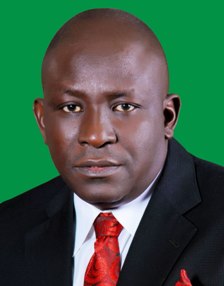
The Federal Mortgage Bank of Nigeria says operators in the informal sector of the economy now has the opportunity of accessing mortgage loans based on certain conditions
At a time when both government and businesses are struggling to fill the estimated 17 million housing deficit in the system, The Federal Mortgage Bank of Nigeria (FMBN) has issued a pleasant news stating that the players in the informal sector of the economy now has the opportunity of accessing estate development loans through the National Housing Fund (NHF).
Kabir Yagboyaju, FMBN Head of Loans Production, told the News Agency of Nigeria (NAN) that this particular window of opportunity was targeted at the informal sector’s cooperative societies and not individuals.
According to him, the idea is for the loans to be used to develop housing estates for members of the cooperative societies
“Contributing to the National Housing Fund (NHF) scheme is not limited to workers. The informal sector is also included and the FMBN has, for some time now, been encouraging the sector to participate in the scheme. The bank is also encouraging them to set up cooperative societies which they will leverage upon to get loans from the NHF.
“One of the FMBN’s loan vehicles that they could benefit from through the cooperative society is the Estate Development Loan”, he said.
Yagboyaju said that cooperative societies would provide the informal sector the opportunity to either acquire land easily or buy into the ones being promoted by some estate developers
Tackling Labour Issues
The Director General of the Bureau of Public Enterprises, Mr. Benjamin Dikki, has revealed that the Federal Government has spent about N609,398,074,485.63 between 2000 and 2013 in settlement of labor liabilities in privatized public enterprises. Speaking after a meeting with the Energy Working Group of the Nigeria-Germany Bi-National Commission, held at the Transcorp Hilton Hotel, Abuja, Dikki noted that the sector break down shows that a chunk of the money was spent in the settlement of labor liabilities in the power sector, which has gulped over N384.062 billion, representing 63% of the entire N609 billion payout.
Next is the telecommunications sector with Nitel/M-tel, staff taking N126, 716,111,589.00 as final pay-off. Transport and Aviation followed with government spending N67, 780,039,618.52 in the settlement of labor liabilities but the bulk of this went to workers of Nigeria Ports Authority (NPA).
The BPE boss noted that the steel sector consumed another N10, 733,347,712.53 to settle labor liabilities while government spent about N8, 950,510,491.00 in the settlement of labor issues in privatized enterprises in the agro-allied sector.
Others are:
* Insurance N4,700,000,000.00;
* Sugar companies N3,527,095,184.00;
* Paper mills N417,447,000.00;
* Hospitality N1,262,708,633.60;
* Cement companies N636,324,705.00;
* Media enterprises N505,874,001.23; and
* Petrochemicals N106,615,529.87
Addressing specifically the labor issues in PHCN successor companies, he said government had shown tremendous goodwill and commitment to resolving all the labour issues in the power transaction, adding that it was the only singular transaction that all the proceeds realized from the sale of power assets were committed to settling labor liabilities.
“Payment of all the workers entitlements is on-going and money set aside to pay all those that have been duly cleared”, he added.
It would be recalled that the Federal Government has demonstrated great commitment in resolving labour issues in the power sector reform and privatization. Apart from committing the entire proceeds realized from the sale of power assets to the payment of the workers’ terminal benefits, government had at the initial stage of the transaction, released N57bn to take care of the workers pension. This came after the government had increased the workers’ salary by 50 percent and regularized some of the casual workers.
he Federal Mortgage Bank of Nigeria says operators in the informal sector of the economy now has the opportunity of accessing mortgage loans based on certain conditions
At a time when both government and businesses are struggling to fill the estimated 17 million housing deficit in the system, The Federal Mortgage Bank of Nigeria (FMBN) has issued a pleasant news stating that the players in the informal sector of the economy now has the opportunity of accessing estate development loans through the National Housing Fund (NHF).
Kabir Yagboyaju, FMBN Head of Loans Production, told the News Agency of Nigeria (NAN) that this particular window of opportunity was targeted at the informal sector’s cooperative societies and not individuals.
According to him, the idea is for the loans to be used to develop housing estates for members of the cooperative societies.
“Contributing to the National Housing Fund (NHF) scheme is not limited to workers. The informal sector is also included and the FMBN has, for some time now, been encouraging the sector to participate in the scheme. The bank is also encouraging them to set up cooperative societies which they will leverage upon to get loans from the NHF.
“One of the FMBN’s loan vehicles that they could benefit from through the cooperative society is the Estate Development Loan”, he said.
Yagboyaju said that cooperative societies would provide the informal sector the opportunity to either acquire land easily or buy into the ones being promoted by some estate developers
